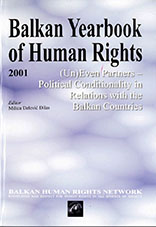Promotion of Rule of Law and Human Rights in Bosnia and Herzegovina: The International Community Role
Promotion of Rule of Law and Human Rights in Bosnia and Herzegovina: The International Community Role
Author(s): Zoran PajićSubject(s): Law, Constitution, Jurisprudence
Published by: Balkan Human Rights Network
Summary/Abstract: It has been six years since the Dayton Peace Agreement (DPA) set down the constitutional framework establishing the state of Bosnia and Herzegovina and its two entities. Progress has been made in taking forward Dayton's provisions, but the majority of constructive steps so far have been taken under pressure from the international community or by directive of the High Representative, who was put in place by the international community to oversee the implementation of the Agreement. In the field of human rights promotion and protection, DPA provided a framework for relevant institutions to be put in place and act on implementing international human rights instruments, including rights and duties from the ECHR. In this context, it is appropriate to point out that the Dayton Agreement has implicitly put Bosnia and Herzegovina under the ,protectorate" of the international community. I am aware that this label is rather controversial, but it sounds more acceptable than "trusteeship". Leaving aside political sensitivities regarding the definition of the Dayton institutional structure in Bosnia and Herzegovina let me illustrate the argument about the protectorate. First and foremost, the Office of the High Representative (OHR) acts as the steering power on behalf of the international community and is based in Sarajevo. The OHR is instructed to facilitate the Parties' own efforts and to mobilize and, as appropriate, coordinate the activities of the organizations and agencies involved in the civilian aspects of the peace settlement". The Constitutional Court of Bosnia and Herzegovina is composed of nine judges, three of whom are foreign nationals appointed by the President of the European Court of Human Rights. A foreigner serves as the Governor of the Central Bank appointed by the International Monetary Fund. The Human Rights Ombudsman was appointed by the Organization for Security and Cooperation in Europe (OSCE). The Human Rights Chamber consists of a majority of foreign members (8 out of 14) appointed by the Council of Europe. Finally, the international armed force deployed in Bosnia and Herzegovina is without precedent as far as manpower, heavy armoury and the mandate are concerned.
Journal: Yearbook of the Balkan Human Rights Network
- Issue Year: 2001
- Issue No: 01
- Page Range: 153-171
- Page Count: 19
- Language: English

